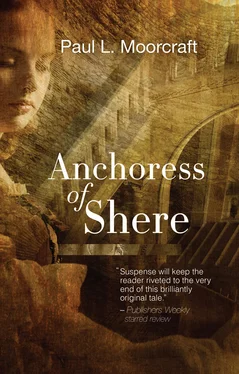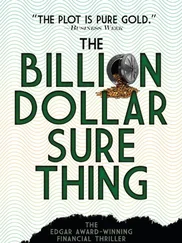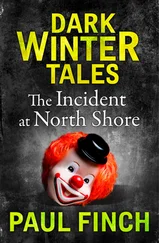Paul Moorcraft - The Anchoress of Shere
Здесь есть возможность читать онлайн «Paul Moorcraft - The Anchoress of Shere» весь текст электронной книги совершенно бесплатно (целиком полную версию без сокращений). В некоторых случаях можно слушать аудио, скачать через торрент в формате fb2 и присутствует краткое содержание. Жанр: Триллер, на английском языке. Описание произведения, (предисловие) а так же отзывы посетителей доступны на портале библиотеки ЛибКат.
- Название:The Anchoress of Shere
- Автор:
- Жанр:
- Год:неизвестен
- ISBN:нет данных
- Рейтинг книги:4 / 5. Голосов: 1
-
Избранное:Добавить в избранное
- Отзывы:
-
Ваша оценка:
- 80
- 1
- 2
- 3
- 4
- 5
The Anchoress of Shere: краткое содержание, описание и аннотация
Предлагаем к чтению аннотацию, описание, краткое содержание или предисловие (зависит от того, что написал сам автор книги «The Anchoress of Shere»). Если вы не нашли необходимую информацию о книге — напишите в комментариях, мы постараемся отыскать её.
The Anchoress of Shere — читать онлайн бесплатно полную книгу (весь текст) целиком
Ниже представлен текст книги, разбитый по страницам. Система сохранения места последней прочитанной страницы, позволяет с удобством читать онлайн бесплатно книгу «The Anchoress of Shere», без необходимости каждый раз заново искать на чём Вы остановились. Поставьте закладку, и сможете в любой момент перейти на страницу, на которой закончили чтение.
Интервал:
Закладка:
“No, I guess you’re right. We could learn a lot from you Europeans, except how to stand up to the Russians. You guys are so weak the Russians could march to the Channel tomorrow.”
Mark let it go because he had learned from their earlier conversations that Gould was a passionate advocate of nuclear disarmament, who wanted to ditch the bomb and force the West Europeans to build up bigger conventional armies…until the Russians were ready to talk peace.
The professor continued, “But culture, that’s different. I wince when I see American tourists over here. Why do they all look fat and stupid? It’s better over there, honestly, but we still spend more on chewing gum than books. We can’t spell any more. All those fast-food signs, the letter ‘U’ for ‘you,’ and all that. America is becoming a monument to bad grammar and trivia. We measure our art in dollars, love in the number of orgasms, and churches have become supermarkets, or the other way around.”
Gould took another big swig of his beer.
“And the South! Heck, I regard myself as a loyal southerner, but it’s like Palestine before Christ; there are more prophets than rocks, and each one of them wants his own church. I just wish more architects would find God. If they do find a good design, in typical American fashion-if you’ve got a good thing, overdo it. I don’t know, Mark, all these prophets, all these lousy churches and yet God, the great architect, has died. God has expired and fifty thousand do-gooding social workers have sprung up in His place.”
“Don’t be so hard on yourself, buddy,” Mark said in an atrocious imitation of Gould. “Your films are great. That’s what’ll change the world. I think that the future will have a slight American accent, lots of Coca-Cola and bugger-all communists.”
The professor laughed. “I hate the Coca-Colaisation of the world. That’s where the Gaullists are right. We need individuality. That’s why Sergeant Pepper is British. That’s why I love you Brits, you have so many eccentrics. Here eccentricity is tolerated, even encouraged. Back home, so much of being an American is not to let your individuality become a social embarrassment, a nuisance in the commercially conformist drive for happy consumers.”
“You’re not a Marxist, are you, Irv?”
The professor ignored the dig. Despite his attempts to ape the current flamboyant vocabulary, he was a scholar and too deeply immersed in his period to pass convincingly for a member of the beat generation. He was not a political activist, despite his hostility to American involvement in Vietnam and his pro-disarmament views. His real world was the Middle Ages, and he could not help but return to it. “I’ve found some incredible material on the Anchoress of Shere-Christine Carpenter-in an abbey near Bordeaux. I should get a few more articles and a conference paper out of it at least.”
The army officer did not understand the world of academic papers and conferences, which seemed a waste of time to him. But he appreciated the professor’s passionate energy, so he put on his best intently listening face.
“The trouble is, the local historian-amateur historian-a Catholic priest who’s written one or two minor things about Christine and the traditions of anchorites-male anchoresses, that is-is rather elusive. I wrote to him from the States, and we’ve met once. He lives just outside Shere. Now he’s surely an English eccentric, a bit of a recluse, I guess. Harmless nut, but he knows his stuff. Bit cocky about his knowledge of the Shere anchoress; might be able to make him eat his words, though. I called him to say that I’ve almost finished my paper and he gave me the brush-off. Weird. You’d think a priest would be vaguely polite, especially if he’s an historian who’s in my field. I’ll try again before I leave. Maybe I caught him on a bad day.”
The Englishman looked pensive. “I don’t remember meeting a priest when I went round with the reward leaflets,” Mark said. “What’s his name?”
“Duval. Father Duval. He lives at Hillside, an old rectory about a mile or so from here. Kind of difficult to find. Have you come across it in your wanderings?”
“No. I’ve checked out nearly every house or farm around Shere, using the electoral roll. But perhaps a priest might not be on it. I could have missed a few people. I’ll find the house on the OS map I’m using,” said Mark, with a renewed interest in the conversation.
“Well, I hope he’s more polite to you than he was to me.”
“Anyway, have you eaten, Irv? No? OK, let’s see what grub is on offer.”
The next day Mark went to Guildford to see Jenny. He enjoyed her company, and not just because she was such a good friend of his sister and somebody who could guide him around the town. Under different circumstances, she could have been special to him. Jenny was obviously extremely distressed by the mystery of her friend’s disappearance, and she recognised Mark’s angst hidden beneath the officer’s bluster. Intuitively, they leaned on each other for mutual comfort. Mark opened up about his feelings in a way that he had never done before, and he learned much about himself and about his sister. He wanted so much to share his feelings with Marda, and was tempted to sublimate his emotional frustrations in a more practical way with Jenny.
One evening as he left her flat she held him, chastely, in an almost sisterly fashion, and said, “If you love Marda enough, and I think you do, and if you are determined enough, and I am sure you are, you will find her. I believe that with my whole heart.”
Mark thanked her and kissed her gently on the cheek. Jenny’s support meant a lot.
His search, however, was more important than his habitual philandering. Mark felt good about that-not much had come between him and his sex drive before. But his loneliness and fear about his sister were forgotten one evening when a quiet meal with Jenny was transformed into hours of gentle but intense sex. He had never needed to lose himself like this before. Previously, he had treated women in the same way he planned his military exercises: tactics, surprise, mobility, feints, and even aggression if necessary; women were prizes to be seized. Being with Jenny was so different that he almost cried after they made love. The loss of Marda, and Jenny’s empathy, accelerated his maturity: he understood consciously for the first time that tenderness had nothing to do with any kind of victory. Jenny’s comforting embrace and Professor Gould’s company in the pub were the few bright spots on a black landscape for Mark Stewart.
Two days after the chat with Gould, Mark decided to visit Hillside. There was a small cottage a quarter of a mile away which had been empty when he had last called. He went back there, and then walked over to the priest’s home.
Mark opened the rusty gate and climbed up the stone steps to the front door. The house had a run-down feel, weeds were running riot in the garden. It looked rather uninhabited, except there were curtains, which were drawn. The professor had told him someone lived there, however, so Mark knocked on the door; then he noticed a bell and tried that. He rang again and waited.
He could hear a shuffle inside. Sounds like an old man, he thought. Eventually, after hearing two locks click, the door opened a foot. A much younger, bigger man than the army officer had expected peered out of the gap.
“What do you want?” the man asked brusquely.
“Er, I’m sorry to disturb you. Are you Father Duval?”
“Yes, what do you want?”
“My name is Captain Mark Stewart. I am looking for a missing woman…”
Even before Mark produced a leaflet, he thought he noticed an odd shift in the priest’s eyes. The officer had been involved in a number of interrogation courses in Berlin, and, despite his bluff cavalryman’s manner, he didn’t miss much. He recorded it all mentally.
Читать дальшеИнтервал:
Закладка:
Похожие книги на «The Anchoress of Shere»
Представляем Вашему вниманию похожие книги на «The Anchoress of Shere» списком для выбора. Мы отобрали схожую по названию и смыслу литературу в надежде предоставить читателям больше вариантов отыскать новые, интересные, ещё непрочитанные произведения.
Обсуждение, отзывы о книге «The Anchoress of Shere» и просто собственные мнения читателей. Оставьте ваши комментарии, напишите, что Вы думаете о произведении, его смысле или главных героях. Укажите что конкретно понравилось, а что нет, и почему Вы так считаете.












